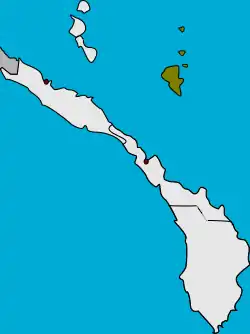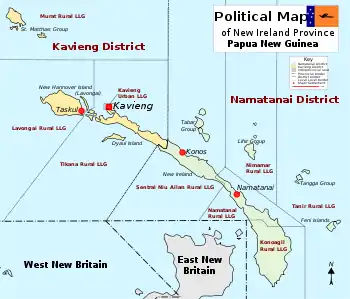Nimamar Rural LLG
Nimamar Rural LLG is a local government area in New Ireland Province, Papua New Guinea. The LLG administers the Lihir Group of islands. The LLG is located in Namatanai District and contains the Lihir Gold Mine, which is the second largest gold deposit in the world. Main language spoken here is the Lihir language. Many speakers of other languages are present here due to the mining on the island. Commonly are Niwer Mil language, Kuanua language and Mandara language.
Nimamar Rural LLG | |
|---|---|
 | |
| Country | Papua New Guinea |
| Province | New Ireland Province |
| Time zone | UTC+10 (AEST) |

District map of New Ireland Province
The current LLG president is Ambrose Silul who is also the Deputy Governor of New Ireland. The total population of the LLG is 25,608 (Census 2011).
Wards
- 01. Londolovit
- 02. Puput
- 03. Matakues
- 04. Lataul
- 05. Komat
- 06. Pangoh
- 07. Hurtol
- 08. Samo
- 09. Lamboar
- 10. Kosmaium
- 11. Kuanie
- 12. Malie
- 13. Malal
- 14. Ton
- 15. Mahur
- 84. Londolovit Township
References
- "Census Figures by Wards - Islands Region". www.nso.gov.pg. 2011 National Population and Housing Census: Ward Population Profile. Port Moresby: National Statistical Office, Papua New Guinea. 2014.
- "Final Figures". www.nso.gov.pg. 2011 National Population and Housing Census: Ward Population Profile. Port Moresby: National Statistical Office, Papua New Guinea. 2014.
- OCHA FISS (2018). "Papua New Guinea administrative level 0, 1, 2, and 3 population statistics and gazetteer". Humanitarian Data Exchange. 1.31.9.
- United Nations in Papua New Guinea (2018). "Papua New Guinea Village Coordinates Lookup". Humanitarian Data Exchange. 1.31.9.
- Lihir at Ethnologue (18th ed., 2015)
- Niwer Mil (Tangga Island) at Ethnologue (18th ed., 2015)
- Hammarström, Harald; Forkel, Robert; Haspelmath, Martin; Bank, Sebastian, eds. (2016). "Kuanua". Glottolog 2.7. Jena: Max Planck Institute for the Science of Human History.
- Mandara at Ethnologue (18th ed., 2015)
This article is issued from Wikipedia. The text is licensed under Creative Commons - Attribution - Sharealike. Additional terms may apply for the media files.